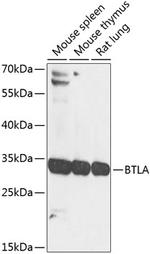Search Thermo Fisher Scientific
FIGURE: 1 / 1
BTLA Antibody (PA5-97029) in WB

Product Details
PA5-97029
Species Reactivity
Host/Isotype
Class
Type
Immunogen
Conjugate
Form
Concentration
Purification
Storage buffer
Contains
Storage conditions
Shipping conditions
RRID
Product Specific Information
Immunogen sequence: KESCDVQLYI KRQSEHSILA GDPFELECPV KYCANRPHVT WCKLNGTTCV KLEDRQTSWK EEKNISFFIL HFEPVLPNDN GSYRCSANFQ SNLIESHSTT LYVTGKQNEL SDTAGREINL VDAHLKSEQT EASTRQNSQV LLSETGIYDN DPDLCFRMQE GSEVYSNPCL EENKPGIVYA SLNHSVIGPN SRLARNVKEA PTEYASICVR S; Positive Samples: Mouse spleen, Mouse thymus, Rat lung; Cellular Location: Membrane, Single-pass type I membrane protein
Target Information
BTLA or B and T-lymphocyte attenuator is a member of the co-inhibitory receptors of the CD28 superfamily. BTLA is a lymphocyte inhibitory receptor which inhibits lymphocytes during immunes responses. BTLA is constitutively expressed on most CD4+ and CD8+ T cells and its expression progressively decreases upon T cell activation. It remains expressed on Th1 cells, but not Th2 cells. BTLA is a unique co-receptor that interacts with the tumor necrosis factor receptor superfamily member herpesvirus entry mediator (HVEM). This interation is an important pathway regulating lymphocyte activation and/or homeostasis in the immune response.
For Research Use Only. Not for use in diagnostic procedures. Not for resale without express authorization.
References (0)
Bioinformatics
Protein Aliases: B and T lymphocyte associated protein; B and T lymphocyte attenuator; B- and T-lymphocyte attenuator; B- and T-lymphocyte-associated protein; BTLA_HUMAN; CD272; CD272 antigen; FLJ16065; MGC129743
Gene Aliases: A630002H24; Btla
UniProt ID: (Rat) Q6PNM1, (Mouse) Q7TSA3
Entrez Gene ID: (Rat) 407756, (Mouse) 208154

Performance Guarantee
If an Invitrogen™ antibody doesn't perform as described on our website or datasheet,we'll replace the product at no cost to you, or provide you with a credit for a future purchase.*
Learn more
We're here to help
Get expert recommendations for common problems or connect directly with an on staff expert for technical assistance related to applications, equipment and general product use.
Contact tech support
